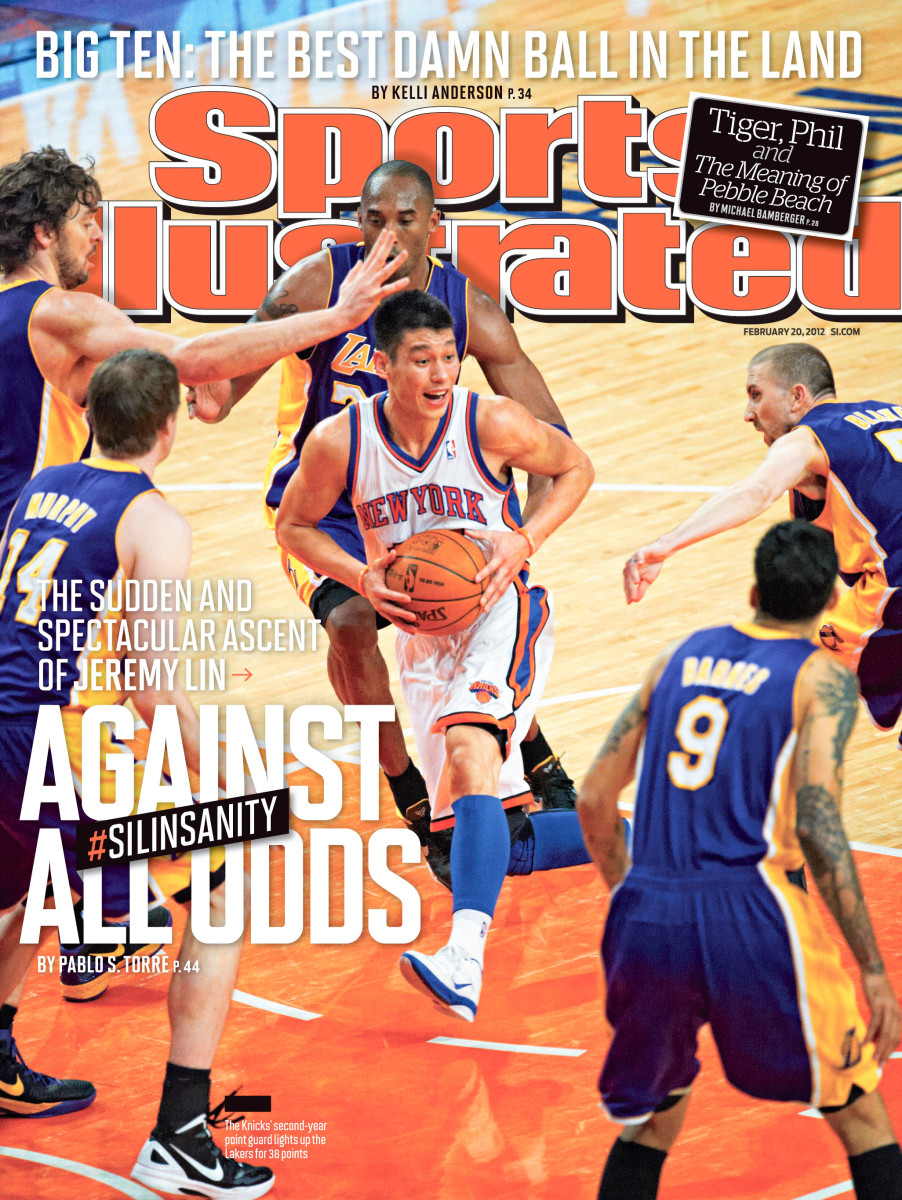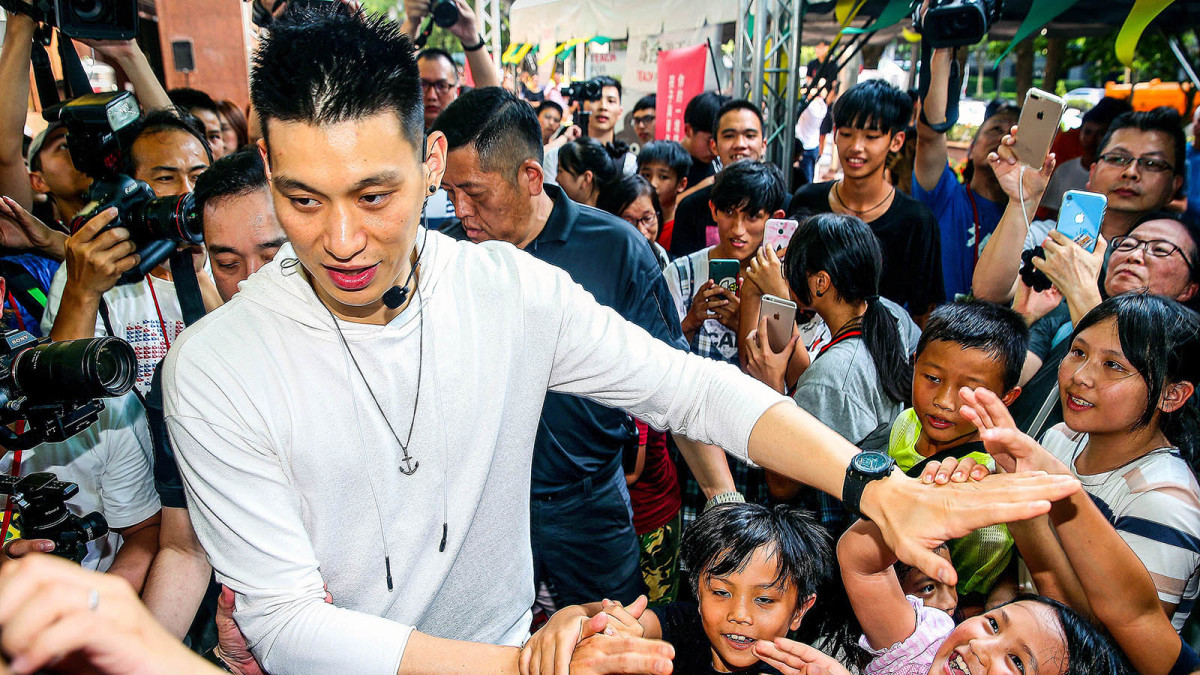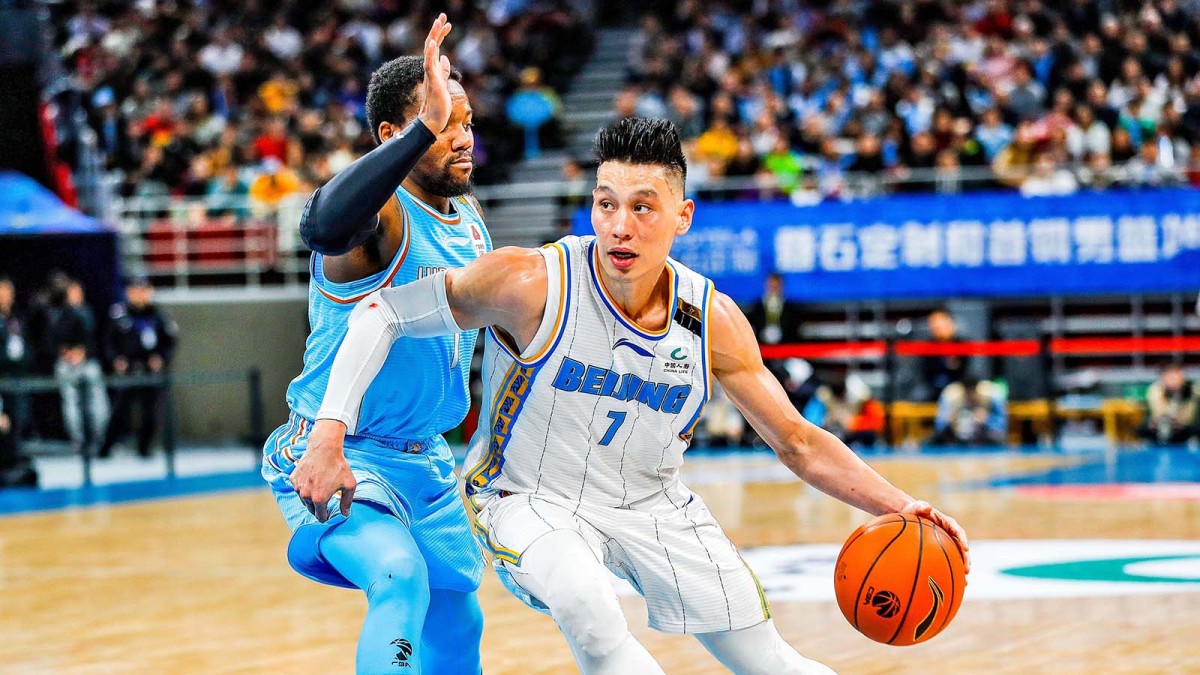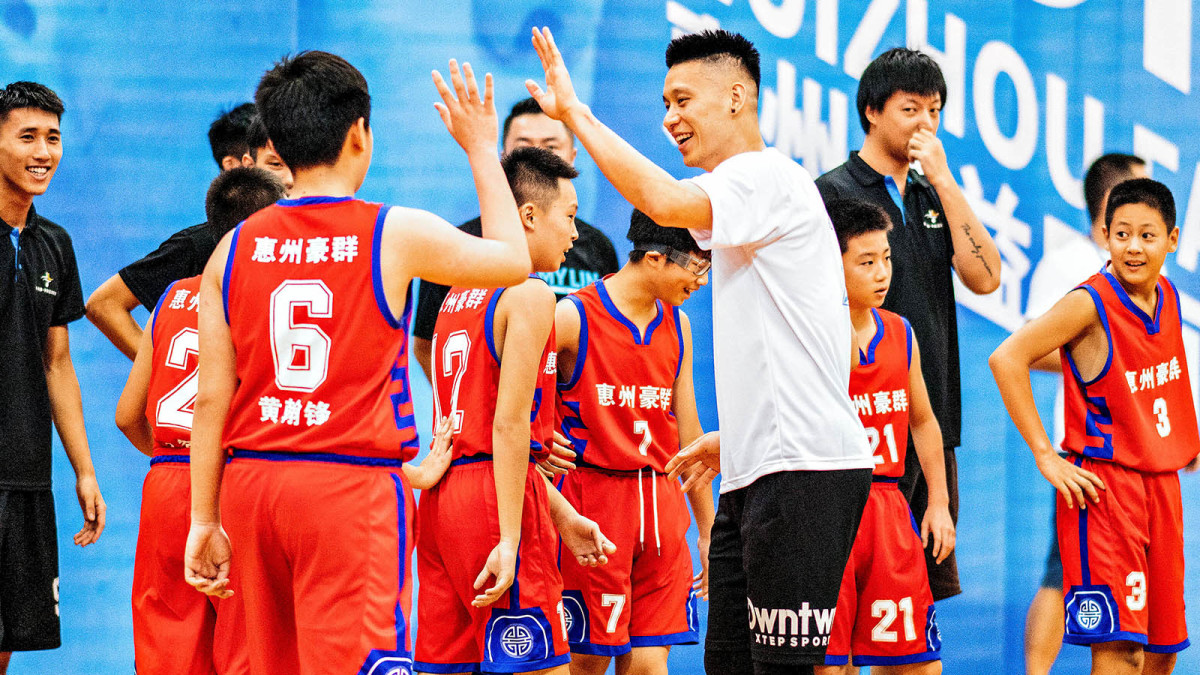Linsanity, Redux: Jeremy Lin's Star Is Shining Bright In Beijing
Hoodie raised high, ballcap tugged low, mouth and nose hidden behind an N95 mask, Jeremy Lin strode incognito through the Beijing airport concourse. Or so he assumed. As he neared immigration on March 19, fresh off a flight from Los Angeles, heading to rejoin the Chinese Basketball Association’s Beijing Ducks after nearly two months of hiatus due to the coronavirus, the former NBA guard was flagged down by an employee in a white hazmat suit, stationed to ensure travelers received proper medical checks before entering the country. “Man, he could barely see my face, and he still recognized me,” Lin says, sounding slightly impressed. “He was like, ‘Can you sign?’ So I was like, ‘For sure, I’ll sign your hazmat suit.’ ”
Halfway around the world, Linsanity is alive and well. Not only do fans swarm Lin, 31, at every turn, but they are always giving him random stuff, too. “Every trip, it was like I needed to bring a suitcase just for all the gifts,” he says. “It was unbelievable.” Many are generic tokens of affection: stuffed animals and tasty treats, cool hats and colorful iPhone cases. Others are particularly . . . personal. “We saw in one of your pictures that you had really dry hands,” Lin recalls some devotees once telling him as they passed over a bottle of moisturizing lotion. Another time he received a whole scrapbook dedicated to his toddler nephew.
“Out here,” he says, “this season has been the closest thing to Linsanity in New York.”

Eight years after his breakout run with the Knicks captivated an international audience—and landed him on the cover of Sports Illustrated for consecutive weeks—it’s not like Lin has been forgotten back home. Last June he made history as the first Asian American to win an NBA championship, lifting the Larry O’Brien Trophy with the Raptors. In March he drew headlines for blasting President Donald Trump on Twitter about “the racism you’re empowering” when he labeled COVID-19 “the Chinese virus.” Albeit a naked ratings ploy, the Knicks even recently honored his impact with a week of Linsanity programming from the 2011-12 season on the MSG Network.
Still his star is shining brightest in Beijing, where Lin continues to live in his stuffed animal–stuffed apartment while practicing each day with the Ducks, waiting in limbo for the CBA to resume after the league suspended operations in late January. Lin has no regrets about his decision to leave the NBA and follow so many other famous castoffs by seeking basketball salvation in China. Not with everything that he has experienced over the past eight-plus months. “I had to get away to refind myself, rebuild myself, redefine myself,” he says, “and I don’t even flinch when I say I genuinely think I’m better than I’ve ever been before.”
In a sense, Lin is exactly where he always pictured himself winding up one day. The idea began taking shape as the star-dusted start to his NBA career faded amid a string of injuries (most notably a ruptured patella tendon in the 2017–18 opener with Brooklyn). He played for eight teams, none for longer than two years. “So many of these really heartbreaking moments,” Lin says, and yet through it all the love never wavered from his maternal grandmother’s home country. “I just felt like, before it was all done, I wanted to play at least one season in front of the fans in China, because of how much they’ve supported me.”
A beat.
“I didn’t expect it to be so soon.”

Not long after the Raptors’ champagne-soaked celebration, Lin was hit with a sobering reality in free agency: No NBA team wanted to sign him. The depths of his ensuing despair were laid bare when Lin delivered a televised sermon at a church in New Taipei, Taiwan, in July—he’s Taiwanese on his father’s side and has been making annual public-speaking sojourns to Asia for more than a decade—in which he tearfully declared that he had hit rock bottom. “It was really, really difficult for me,” Lin says now. “I had so many dreams and ambitions, to not see so many of them come to fruition . . . it’s a bit heartbreaking.”
Granted, he could have done far worse for a safety net than the CBA, where import players (max two per team) are given multimillion-dollar salaries, five-star accommodations and green lights on offense. All those perks awaited Lin after he signed with the Ducks in August 2019, but he also discovered something that he didn’t expect.
“As I went through the season, I was able to see how these injuries and crushed dreams have really affected me,” he says. “I realized, in certain situations where I used to not think, I was [now] more fearful, more hesitant. I had to reconcile a lot of things from my past to get to where I am today, where I’m playing so confidently and freely and joyfully. I don’t think I’ve ever been as mentally free and as healthy and as skilled.”
The Ducks were 19–11 when the league went dark, sitting comfortably in a playoff spot with a third of the schedule left. Much of this was thanks to Lin, who paced the team in points (24.2 per game), assists (5.8) and steals (1.8) while racking up more All-Star fan votes than any CBA player besides Guangdong center Yi Jianlian, the Chinese national team captain.

Lin and the Ducks last played on Jan. 21, losing 108–92 to the Royal Fighters, their crosstown rivals led by first-year head coach Stephon Marbury. A week or so later Lin flew home to the United States in anticipation of waiting out the coronavirus, which had only just begun to reach American soil. As it spread, so too did instances of anti-Asian racism. “I mean, it’s bad,” Lin says flatly. “I’d go to the grocery store, I’d have a mask on, and I’d see the way people would look at me. Everyone knows somebody who’s been targeted. It’s everywhere.
“The truth is, Asians, and Asian Americans, we’re going through a tough time right now. We’re not the first minority group to go through it, and we won’t be the last. But if we can promote unity and solidarity, if we can stand up for ourselves, then we have a chance to stand up for other minority groups as well. To me, that’s the endgame.”
More than any on-court growth that might help him eventually find his way back to the NBA, a deeper sort of evolution has defined Lin’s short time in Beijing, reinforced whenever he goes out to eat with his Chinese teammates or converses with them in his fluent Mandarin. “I grew up with an Asian cultural upbringing, but with a U.S. culture outside the home,” says Lin, “so I have this unique mix. Now that I’m immersed in Asian culture, I can understand it even more deeply. The food, the language, the connection with the fans, social media, even the way that I talk and the way that I think—there’s so many ways that it’s different here than in the U.S., and I feel like I’m in this middle ground between both of them. It’s a beautiful place to be.”
Especially since he got out of quarantine.
After signing the hazmat suit and clearing immigration in mid-March, Lin was whisked to a government-run hotel in the city, where he would spend the next two weeks under strict isolation as a precautionary measure. Meals were placed outside his door, three times a day. Laundry was washed in the sink and hung to air-dry. Exercise consisted of clearing his bed into the corner of his small room and running from wall to wall, hundreds of times over, mixing in defensive slides, crossover steps and other basketball movements.
Lin stayed busy in other ways too, reading the Bible, video-chatting with family, and penning a Players’ Tribune article that announced his intention to contribute up to $1 million to help buy personal protective equipment (PPE) for health care workers and food for families affected by the virus. By the time his quarantine ended, though, the sole reason that he’d returned—to resume the CBA season—had been put on ice by the Chinese government.
“We’re training. We’re preparing,” Lin says of the Ducks, who often have full-contact practices twice a day on top of multiple weekly weight room sessions, “but we don’t really know what for, or when.”

Even as sports remain shuttered, other areas of life in Beijing are returning to normal. Restaurants are open, albeit with temperature checks at the door and socially distanced table setups. Mopeds and cars clog the roads with rush-hour traffic as people head to and from work. “The biggest thing is just, we’re able to do what we want to do. It’s different. When you’re finally able to go out, you’re almost scared. Is it safe? Is it O.K.? But as you start to do it more and more, you’re like, ‘It is pretty safe, otherwise they wouldn’t allow us to do it.’ ”
Ultimately, though, Lin really just wants to do one thing. It’s why he swallowed his pride and walked away from the NBA last summer. And why he has no qualms if the CBA season resumes without fans in the stands, as has been suggested. “I’m totally fine with that,” he says. “I want to hoop. I want to compete.”
Until the pandemic hit, Lin was locked on helping the Ducks into the playoffs. After that, perhaps his agent would have gauged the NBA market to see whether any team wanted to bring him back for the stretch run. Now, of course, the future is much cloudier. “I’m going to reevaluate my options this upcoming . . .” Lin says, trailing off. “I can’t even say summer anymore, because no one really knows when free agency is going to be.”
And yet, Lin has also never been more certain about the direction his career has taken. Once haunted by the discrepancy between the attention he earned in the wake of Toronto’s title and the minimal role he played on the court in making it happen, Lin has come to terms with how his NBA exit played out. As he chats on the phone from his Beijing apartment, he is sitting next to a personal safe with his diamond-encrusted Raptors championship ring locked inside. “I got to the point where I was like, ‘Did I earn it?’ I didn’t contribute the way I wanted, but I was good enough to be on that team and to be an NBA player,” he says. “For me, I still have a lot of goals. I still have a lot of things that I want to accomplish.
“And I still have time.”
